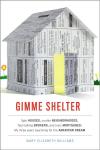Live Nude Books: You’ve written several personal narratives for a number of publications; have you always had a desire to write a memoir? What made you choose to write about this subject—the experience of purchasing a home?
Mary Elizabeth Williams: I’ve always written first person — I would go on field trips as a kid and come home and compose an essay about what I did and how I felt.
The challenge for any writer is to get out of your own navel and figure out how your own experience will resonate on a more universal level. That’s why I chose to do a book about home — it wasn’t something unique to me, it’s something anyone who’s ever had a roof over his or her head has context for. And what happened during the housing bubble was particularly dramatic — I wanted people to know wherever they were and whatever they went through, they weren’t alone.
LNB: In the book, you develop and explore several themes: familial bonds, friendship, security, and how place contributes to a person’s identity. When you began working on the memoir, did you have an idea for the types of themes you wanted to touch on? Did those themes emerge naturally through the writing process?
MEW: The book went through some changes — originally a lot more took place in my childhood. But as I refined the narrative, I was more involved in the story of a family in a particular place and time in history, so that began to take more of the center stage. As I got more confident as a first time author, I realized you don’t need to know my whole life to get why buying a home was so important. I also wanted to emphasize that this notion of the “ownership society” wasn’t just something that hit me because of my specific circumstances — it was something that was very aggressively peddled to the American people in general. That’s why I brought in the stories of my friends and family and their homebuying experiences.
LNB: During the three-year process of becoming a homeowner, you were raising two kids and working. How were you able to find time to write this book? Do you have a writing routine?
MEW: Well, sleep is the first to go. I got in the habit very early on of firing up the laptop right after putting the kids to bed, and making myself do at least a solid hour every night. I could carve out longer blocks on the weekends. No checking email. No surfing. Just me and a word document.
The key is to just bang away and keep banging. I cut a lot of parts and I rewrote even more, but if you’re in the routine of writing, you become very Pavlovian about it.
LNB: What are you currently working on?
MEW: I’m writing regularly for Salon.com and continuing to contribute to PRI’s morning show, and I have two messy, much too unformed book ideas. Summer has kicked my routine to bits, so the plan is to start developing the next book more fully in the fall. I’m basically going to put both ideas in the steel cage, write every night, and see which one emerges victorious.
LNB: What have you recently read that you’re recommending to friends and other readers?
MEW: Lily Burana’s, I Love a Man in Uniform, is great — it’s the story of an unlikely military wife that’s incredibly funny and moving and taught me so much about this world that’s so alien to me. And I’m just finishing Richard Kadrey’s Sandman Slim. You could call it a supernatural noir novel — imagine Sam Spade if he’d gone to hell and you start to get the idea. It’s fantastic.
 Dave Reidy is the author of Captive Audience, a short story collection. He has an MFA from the University of Florida, and his work has been published in Pindeldyboz and The MacGuffin. His story, “The Regular,” was selected by Charles D’Ambrosio as the winner of the 2007 Emerging Writers Network Short Fiction Contest.
Dave Reidy is the author of Captive Audience, a short story collection. He has an MFA from the University of Florida, and his work has been published in Pindeldyboz and The MacGuffin. His story, “The Regular,” was selected by Charles D’Ambrosio as the winner of the 2007 Emerging Writers Network Short Fiction Contest. From the publisher: “The lives of three strangers interconnect in unforeseen ways–and with unexpected consequences–in acclaimed author Dan Chaon’s gripping, brilliantly written new novel.”
From the publisher: “The lives of three strangers interconnect in unforeseen ways–and with unexpected consequences–in acclaimed author Dan Chaon’s gripping, brilliantly written new novel.”
